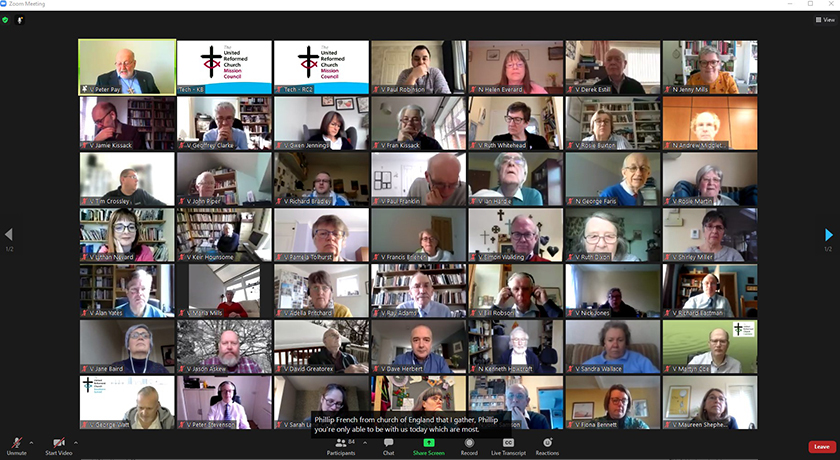 The spring meeting of Mission Council, the executive body of United Reformed Church (URC) General Assembly, was held from 15-17 March. Due to Covid-19 restrictions, the meeting was held digitally.
The spring meeting of Mission Council, the executive body of United Reformed Church (URC) General Assembly, was held from 15-17 March. Due to Covid-19 restrictions, the meeting was held digitally.
Opening worship
After a welcome from Peter Pay, one of the Moderators of the URC General Assembly, Mission Council began with worship.
“God says come in,” were the opening words from the Revd Helen Everard, Chaplain to the Moderators. Heroes and villains, the theme for URC children’s and youth work for 2021, is the theme for worship.
The Revd Peter Stevenson, Convener of the URC Communications Committee, read from Genesis 18, about Abraham at Mamre.
A Bible study followed from the Revd Dr Janet Hopewell, Associate Minister at St Ninians, Pagham, and Chaplain and Advocate to the Elderly for the URC’s Southern Synod.
As a child, Janet received and read a book about Greek mythology from her uncle John. More recently, she read Mythos, a retelling of those myths by Stephen Fry. Isn’t it funny, Janet asked, how history can repeat itself?
Janet shared the story of Philemon and Baucis, an old married couple who received the gods Zeus and Hermes, disguised as travellers, after they had been turned away by neighbours. To thank them for their hospitality, Zeus granted them a wish.
The couple wanted to die together and when their wish was granted, they were turned into entwined trees for all of eternity.
Abraham was 99 years old, sitting the shelter of his tent when he sees visitors approaching and offers them a sumptuous meal. His first duty is to care for them. He is then honoured by a serving God. But how did he cope with fatherhood as a centenarian?
At a conference on faith in older life, one of the speakers said that the measure of how we react to older people is the measure of our humanity. For example, if a baby is sick on you, it’s a badge of honour. Not so if it’s an older person.
“I believe in the quiet courage of ordinary men and women leading everyday lives. Abraham gets on with it and so should we. When our church buildings are open again, let’s take a fresh look at our aged congregations with all their limitations and accumulations of experience.”
Following the Prayer of Dedication and The Lord’s Prayer, the Petersfield and Liss URC Band sang Blessed be your name by Matt Redman.
Mission Council then approved the minutes of November’s meeting.
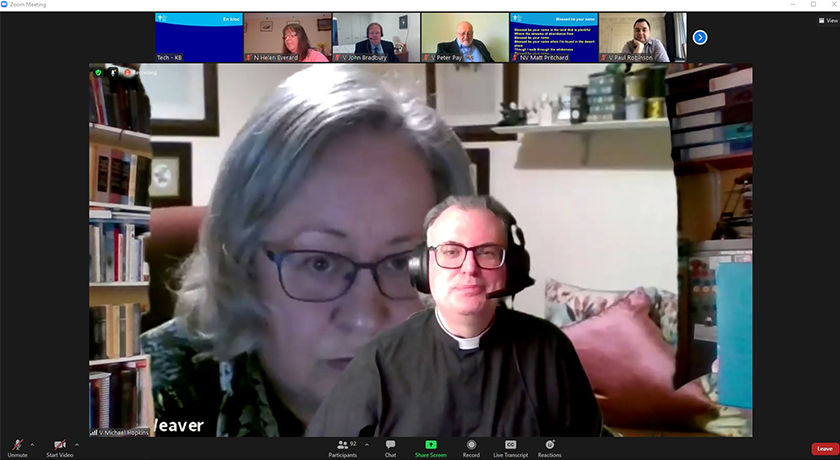 Before the business of session one began and in good fun, the Revd Michael Hopkins warned Mission Council that he had brought ‘back-up’ with him before apologising for the delay to the Communications Committee that Paper C3 had been withdrawn from en bloc, which led to the paper being withdrawn for further consideration. His back-up was a virtual background image of Jackie Weaver, Meeting Clerk for the Cheshire Association of Local Councils, who became an internet sensation after dealing with argumentative councillors on a Zoom call.
Before the business of session one began and in good fun, the Revd Michael Hopkins warned Mission Council that he had brought ‘back-up’ with him before apologising for the delay to the Communications Committee that Paper C3 had been withdrawn from en bloc, which led to the paper being withdrawn for further consideration. His back-up was a virtual background image of Jackie Weaver, Meeting Clerk for the Cheshire Association of Local Councils, who became an internet sensation after dealing with argumentative councillors on a Zoom call.
Session one
En bloc resolutions
The following resolutions were passed en bloc. En bloc resolutions are voted on without debate, having been deemed uncontroversial. This has no reflection on their importance. The full reports and resolutions in each case can be read at urc.org.uk/march-2021.
C1: Communications Committee update
A report on the work of the committee and team, including pandemic guides and Lent and Advent kits.
(Revised guidelines for using social media in Paper C3, will be debated at General Assembly.)
C2: URC digital charter
Mission Council commends the digital charter, a pledge to engage well with people on social media, and to view the digital environment as a positive place for such activity.
D1: Education and Learning Committee update
A report on the work of the committee and team, including the redesign of Education for Ministry phases two and three.
(Revisions to the Discipleship Development Strategy will be debated by Mission Council in resolution D3. ‘Marks of Ministry’, a description of what the Church can expect of those called to be worship leaders or lay preachers, will be debated by Mission Council in resolution D/H1.)
D2: Education and Learning Committee sizing
Mission Council accepts the proposal to reduce the size of the committee from 25 to 18 and to update the terms of reference for all its roles.
D4: Integration consultation update
A report on the continuing denomination-wide consultation on developing a more integrated education and learning system. A significant number of responses have been received and there is an appetite for change.
F1: Faith and Order update
A report on the work of the committee, including the publication of a series of ten booklets under the heading: ‘What do we believe about …?’
G1: Pensions update
A report on continuing conversations across the URC concerning the challenges that face the Church with regard to its pension schemes. Funds have been affected by low interest rates and the guidance from the pensions regulator has become more onerous – changes which are proving costly at a an uncertain time for Church finances, as a result of the Covid-19 pandemic.
(Future pensions will be debated at Mission Council, in resolution G3.)
Paper H1: Capability Policy
Following consultation, a change has been made to the wording of the URC’s ministerial capability process, which was provisionally agreed by Mission Council in November 2020.
(‘Marks of Ministry’, a description of what the Church can expect of those called to be worship leaders or lay preachers, will be debated by Mission Council under resolution D/H1.)
Paper I1: Mission Committee update
A report on the work of the committee and team, including Legacies of Slavery, becoming an anti-racist church, and the Beirut emergency appeal.
En bloc passed by consensus
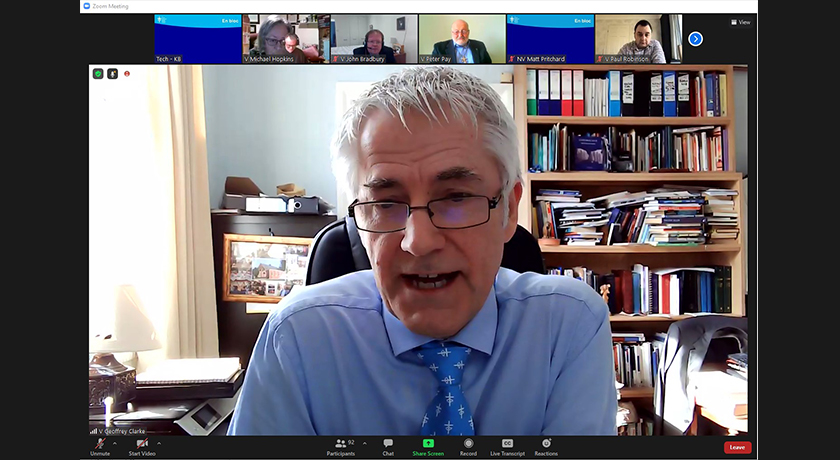 Thanks expressed
Thanks expressed
The Revd Geoffrey Clarke, Moderator of the East Midlands Synod, shared with Mission council how after a recent synod meetings, representatives felt that Paper C1: Communications Committee Update, was worthy of acclaim. He said: “Together we felt a sense of pride and appreciation for the scale and quality of work produced by the Communications Team. We are grateful and want to say well done Communications, much pride and thanks.” This was echoed by Mr Pay.
Paper A1
The Revd Dr John Bradbury presented Paper A1: Toward the future of the URC on behalf of the Business Committee.
John advised Mission Council that due to extraordinary pace of secularisation, the URC had reached a time where it needed to reflect on its direction.
“When we stop and take seriously the world and our place in it, we see that things are radically different to 50 years ago when the final preparations were being made to bring the United Reformed Church into being,” He said. “Our calling is to take that reality seriously. Our calling is to ask ourselves what, out of the place we find ourselves in the world, God would have us discern? What are we called to understand in new and different ways? What are we called to repent of – to turn around from, and begin again renewed in the power of the Spirit?”
As part of the Reformed tradition, John added that the URC has never believed in one permanent form or structure and that in new moments, the denomination needed to return to scripture to ascertain what God is saying to us here and now.”
As the URC approaches its 50th anniversary, John added that the faithful thing for the URC to do is to pay attention to the place that God has brought it, and for the Church to ask itself some difficult questions: “Is the house that we are living in, with its structures and forms, the way its resources are stewarded, the legal entities that sit behind it – are they really the right shape and size such that in 20 years’ time the United Reformed Church will be able to concentrate on its vocation to worship, evangelism, witness and service? Or are we in danger of living within a structure that eats all our time and energy just to keep going, until the moment we find we’re just not going?”
John made clear that he was not asking Mission Council to make a decision on these questions, but instead for it to appoint a small group of six which will oversee a process of reflection and change. Groups were asked to reflect on the gifts and grace that the group would need if the church were to have confidence in them. He said that many others would need to be drawn into the work in time, and General Assembly would be asked to determine the scope and approach the work took when it met in July. John added that he hoped that this would result in a review of the structures, resources, and work of the Church that would respond faithfully to the challenges present in Paper A1.
Mission Council then broke up onto groups to think on what kinds of gifts and graces would be required in any such group, and if the Church was indeed being called to set of such a path.
Session two
Feedback from groupwork on proposal of review
Session two of Mission Council began with feedback from Paper A1’s groupwork on the future of the URC.
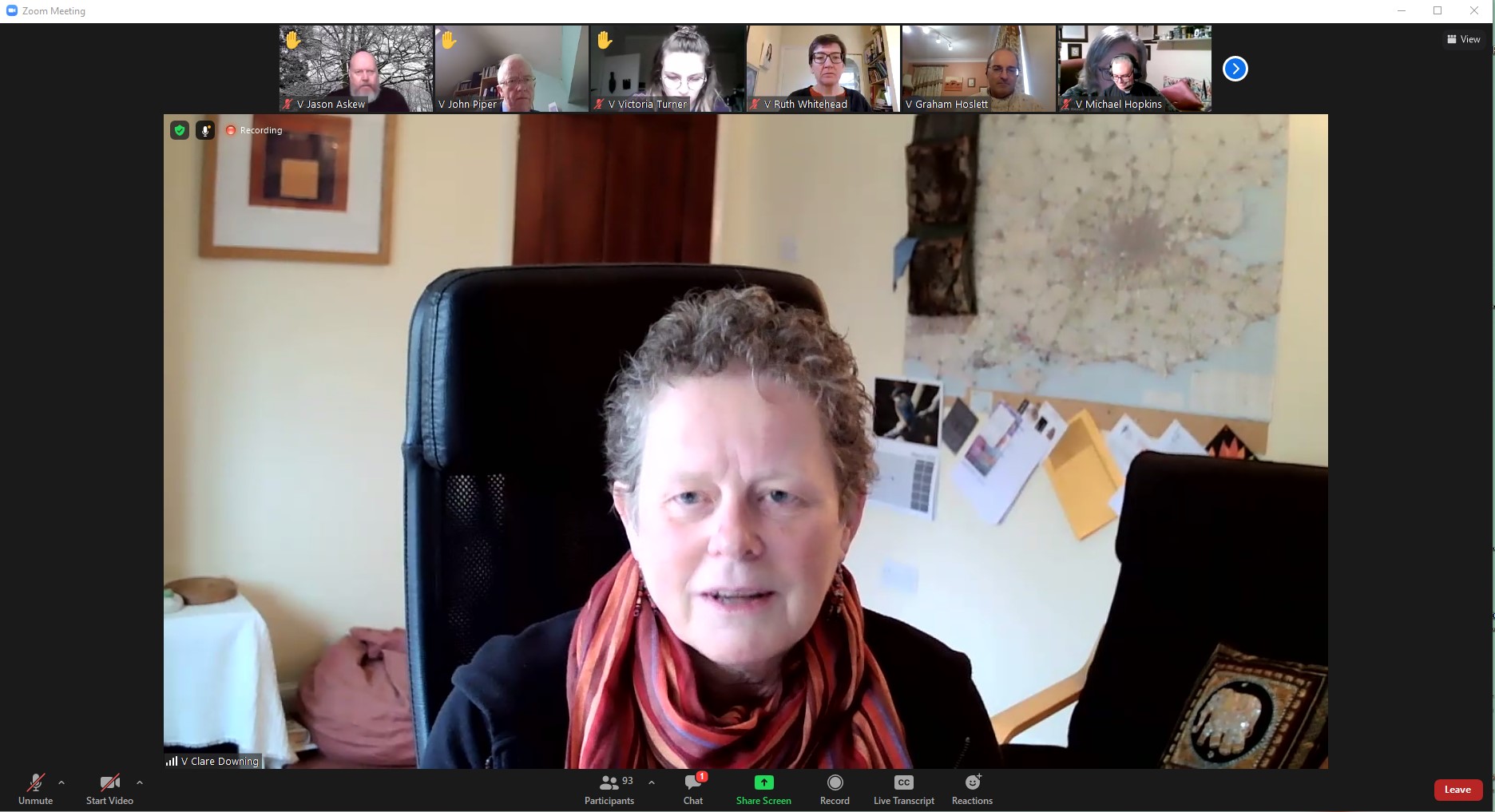 Questions taken from the floor included: what the costs of such a group and review might be, if the size of the group was sufficient, how would the right people be involved, is there a need for two groups: one to steer the process and one to oversee the whole process including the steer, how would every voice of the Church be heard, how would the gifts and graces needed would be ascertained?
Questions taken from the floor included: what the costs of such a group and review might be, if the size of the group was sufficient, how would the right people be involved, is there a need for two groups: one to steer the process and one to oversee the whole process including the steer, how would every voice of the Church be heard, how would the gifts and graces needed would be ascertained?
Comments were also made about the URC’s track record on small group work which was said to not be as successful as the Church would have hoped. John agreed with this point but added: “This is not a reason for not moving forward.” He added that it was important for all councils of the Church to be heard hence why the mind of Mission Council was being asked to be tested now.
An amendment to the resolution was proposed in regard to removing the limit of the amount of people in the group.
The resolution then read: “Mission Council invites the Officers of the Assembly, in consultation with the Nominations Committee, to appoint a small group to oversee a review of the structures, resources and work of the United Reformed Church to enable us to respond faithfully to the challenges present in paper A1. The review group is asked to report to each Mission Council and General Assembly and to bring recommendations and resolutions when appropriate. It invites the group to bring a proposed remit and timescale for work to General Assembly 2021.”
The amended resolution was passed.
New URC website
Following feedback and discussions about the URC website, last redesigned a few years ago, the Communications Team engaged Yaku Labs, led by Leon Green and Matthew Warnock-Parkes, highly experienced digital managers who met while working at the Disasters Emergency Committee (DEC) charity, to help with the process of creating a new website.
In Paper C1, the team shared that of the 616,738 website page views from 2020, just 72 of the 5,000+ pages were responsible for 70% of visits.
Introducing Yaku Labs’ presentation to the Mission Council, Andy Jackson, Head of Communications, said that the first part of audience research had been completed, and the next phase of research and development was now underway. The meeting was given an insight into that research before it broke into groups to consider a series of questions.
A look at faith in the UK revealed that religious people are happier! 53% of the UK population describe themselves as Christian of which 29% of those attend church or religious meetings once a month or more. 30.3% of the population are agnostic, and 9.9% atheists.
Websites with audiences similar to those of the URC website – the Church of England, the Church Times, the Methodist Church, and YourChurchWedding.org – revealed that the URC can learn more about how those websites drive people to the URC site, called referrals.
It could also work on making more of existing referrals, such as the high number of people who visit the URC website after visiting YouTube, against the lower number of visitors from Facebook.
Of existing visitors to the website, unusually more men than women visit it, but as expected the biggest age groups of visitors are 55-64-year olds, followed by 45-54-year olds and then 25-34-year olds. But when they arrive, finding content was neither easy nor enjoyable.
In creating six personas, typical users of the website, various categories were established – curious – those interested in faith; worshippers – those already part of the URC; and providers – leaders, staff and volunteers. All should be engaged on the website whether they are casually exploring faith or visiting to find a specific document.
In one to one and group interviews, the following insights were also shared: the website should be a source of inspiration and information; it should be dynamic, clear and story-orientated; the homepage should be uncluttered; the menu options should be streamlined; resources and documents should be clearly signposted, discoverable and up to date; community engagement should be highly visible; the site should support faith discovery and development; and it should have a modern and flexible look and feel.
The meeting then broke into groups and a number of questions about the purpose of the URC, how the URC gets explained to others and how that purpose if fulfilled and measured. The new website should be launched later this year.
- The audience research paper from Yaku Labs can be found with the other papers for the meeting here.
Paper M1: The Daily Devotions and Daily Devotions Sunday Service
Paper M1 on Daily Devotions and its online Sunday Service was presented by the General Secretary, the Revd Dr John Bradbury.
Daily Devotions, the URC’s popular digital resource, which was started as a personal initiative by the Revd Andy Braunston, has grown to the point where is received by 4,000 people each day. At the start of lockdown, the work was extended to include an online Sunday service, which 1,500 people take advantage of. Mr Bradbury thanked Mr Braunston for the great deal of work it took to create and edit this resource that has been of such benefit to the Church.
The resolution proposes a consultation on making Daily Devotions a more integral part of the work of the Church and developing it further, bringing proposals to this year’s General Assembly.
Members of Assembly voiced warm enthusiasm for the proposal, and thanked Mr Braunston and his team for Daily Devotions. One suggestion was that the proposal would be an opportunity to make the Sunday service more reflective of the diversity in styles of worship throughout the URC. Mr Bradbury agreed and said that, as a more official denominational initiative, it would also need to be intergenerational.
The resolution was passed unanimously.
Closing prayers, were led by the Revd Helen Everard. Before beginning, Helen expressed gratitude to the URC’s Children’s and Youth Work team, who with Helen Boxer, produced resources and images for the closing prayers based on URC Youth Assembly’s theme for 2021 ‘Heroes and Villains’.
Day two
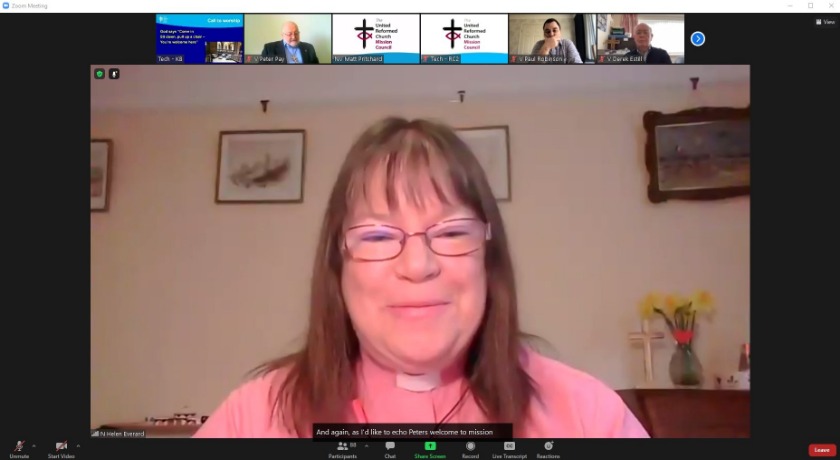 Opening prayer and Bible study
Opening prayer and Bible study
The Revd Helen Everard, chaplain to the Moderators of General Assembly, led worship on the second morning of Mission Council. Rosie Martin, a member of the URC Equalities Committee, read from the story of the woman at the well in John chapter 4, and the Revd Samantha Sheehan, a special category minister working as a university chaplain in the Yorkshire Synod, offered a reflection on the passage.
Picking up on URC Youth’s 2021 theme of heroes and villains, Ms Sheehan said that we might respond to the Samaritan woman who met Jesus as a villain. We might assume that, coming to the well in the middle of the day, she is a woman of ill repute and judge her for that.
Such assumptions, however, said Ms Sheehan, are “smudges on our reading glasses”. If we remove them, we find this is not a story about a sinner challenged by Jesus and repenting. Rather, she is a strong woman who crosses boundaries to encounter Jesus, and this is a story about ‘what it is to be seen and fully known by God’. Finding that she is seen, the woman then invites others to see for themselves. And she sees who is before her – love incarnate in Jesus.
Ms Everard offered a challenge to Mission Council: “Who are the people in our society who are vilified, who come to the well in the middle of the day? Once we have seen them, how is God using them to bring light into dark places?” She concluded: “Because I am known by God I want to share that with other people.”
Session three
Paper G2: URC Future Pensions discussion
The Pensions Committee and Finance Committee started a discussion at the Mission Council to help inform its approach about decisions being made at the General Assembly in July.
John Piper, the URC’s Deputy Treasurer, began the discussions by saying that he was grateful that the Holy Spirit was with us the meeting, as mentioned during the opening worship.
He offered some reassurances: the URC pension schemes are now better funded now than before the global financial crash of 2008. And the challenges faced now are not because of anything the URC has done, but because the world of pension has changed.
If the General Assembly in July decides to explore possible changes to the schemes, that only affects the future – existing pensions are always guaranteed. The purpose of the discussion is to help us make the presentation to the General Assembly better.
In June 2020, Mission Council reaffirmed the Church’s commitment to provide good pensions to its ministers and staff.
Pension costs have risen substantially over the past 13 years because of low interest rates, and costs will rise further because of the Pensions Regulator’s requirement for increased cautiousness. This in turn raises questions about affordability and value for money. And any change would only affect the future growth of pensions.
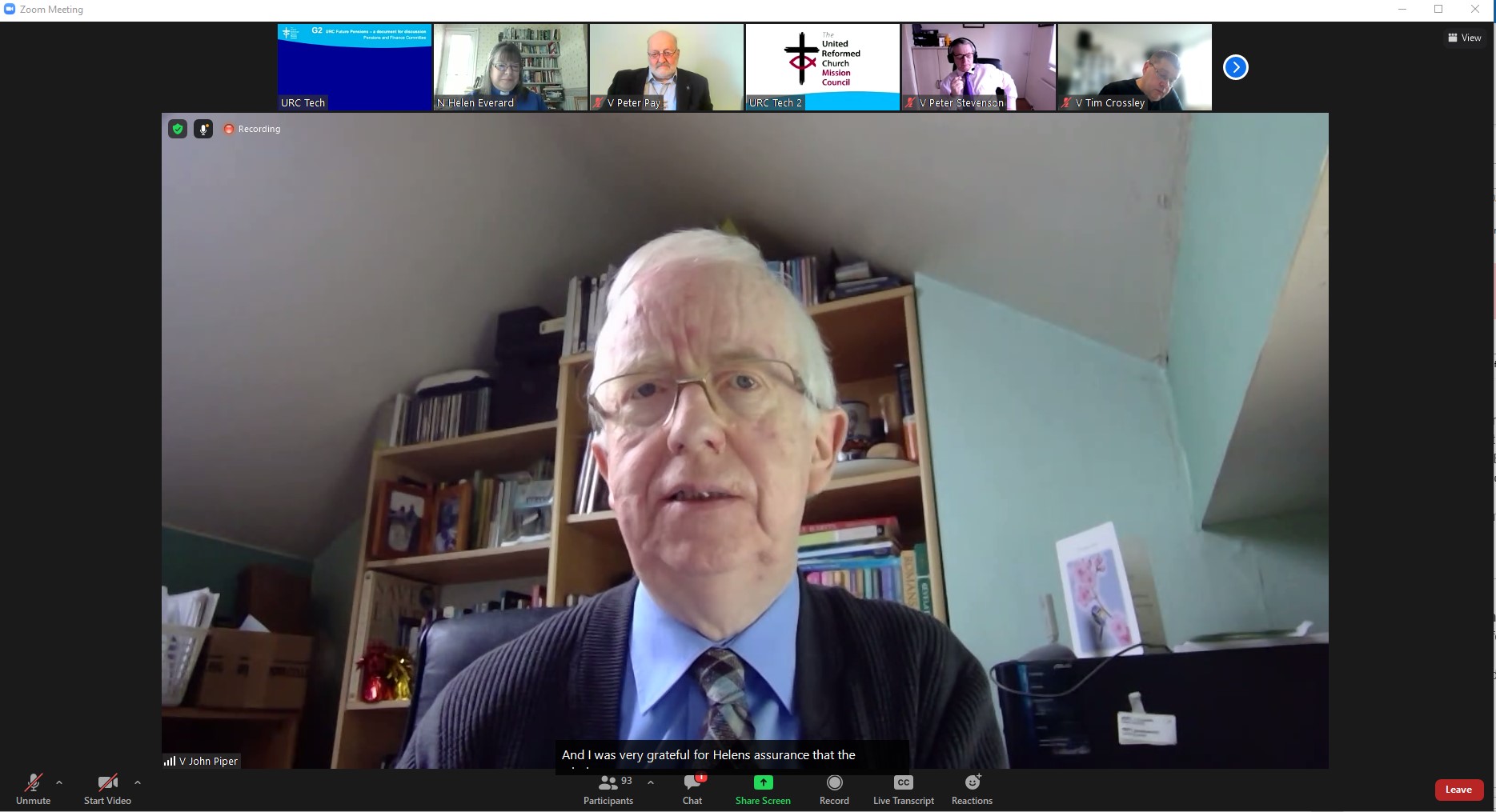 Pensions already earned from past service are legally protected and changing pension arrangements is complex and costly, so the committees are taking these discussions one step at a time, paper G2 said.
Pensions already earned from past service are legally protected and changing pension arrangements is complex and costly, so the committees are taking these discussions one step at a time, paper G2 said.
No recommendations about future pension arrangements were included in the paper but it laid out the issues before the Church along with estimated costs and benefits of alternative pensions provision.
Mr Piper explained that the estimated contributions with the existing schemes could rise to 38.2% in 2030, some £3.6m, up from 12.3%, £1.1m, in 2010. This is because lower risk investments are now needed and other factors.
Different schemes
Both the existing pension schemes for ministers and lay staff are Defined Benefit (DB) schemes. This means that the method of calculating the pension payable is pre-determined.
The main alternative to a DB arrangement is a Defined Contribution (DC) pension scheme, which would also be managed by a trust company. Here, the levels of contributions by the Church and members are fixed (but may be changed after due notice). These contributions are invested on behalf of the members. At retirement, each member has a pension pot which is used to pay them a pension.
The pension schemes of other denominations were also shared in the report.
- The Church of England has a relatively new DB arrangement for clergy but not for lay staff who have switched to DC.
- The Methodist Church has a DB scheme for ministers but have just closed their staff DB scheme to future accrual and are putting a DC plan in place.
- The Baptist Union closed all DB schemes and only offers a DC scheme, the Congregational Federation only offers DC as does the Church of Scotland
- The Salvation Army has a DB arrangement for officers but DC otherwise. The DC scheme offers a range of options to staff.
After seeing a number of comparisons of the existing pension scheme and potential alternatives when applied to different people – a 28-year-old just entering stipendiary ministry, a 43-year-old with 15 years of past service and a 58-year-old with 30 years of service – the meeting broke into discussion groups.
Session four
Feedback from groupwork on future pensions
In the following plenary session, Sam Richards, as a group reporter, asked how the General Assembly would engage with the discussion, and her group suggested a pre-recorded presentation for the meeting for representatives and Synods to use before the paper is presented in July.
Andrew Prasad said that a holistic approach is talked about in the URC but not always achieved. We’re not always encouraged enough to take responsibility and we should be better prepared.
Graham Hoslett said that his group reflected that the same stipend is received by ministers and going to a defined contributions scheme could mean ministers could go from a fixed scheme to one which is variable. John Piper’s presentation at the last Mission Council was superb and a similar presentation would help, as would pre-Synod discussions with the Synod Treasurer.
Geoffrey Clarke said learning styles are different and also suggested a video presentation.
George Watt said that the Pension Wise website is a good resource and his group wondered whether the topic was too big for General Assembly, and if a sub-group could do some of the leg work before the meeting.
Jenny Mills said her group felt sustainability was important as was pastoral care. Retirement age was not mentioned in the paper which could help with some focus. The projections should also include those who come to ministry later in their careers, and that there are varying degrees of understanding on complex issues.
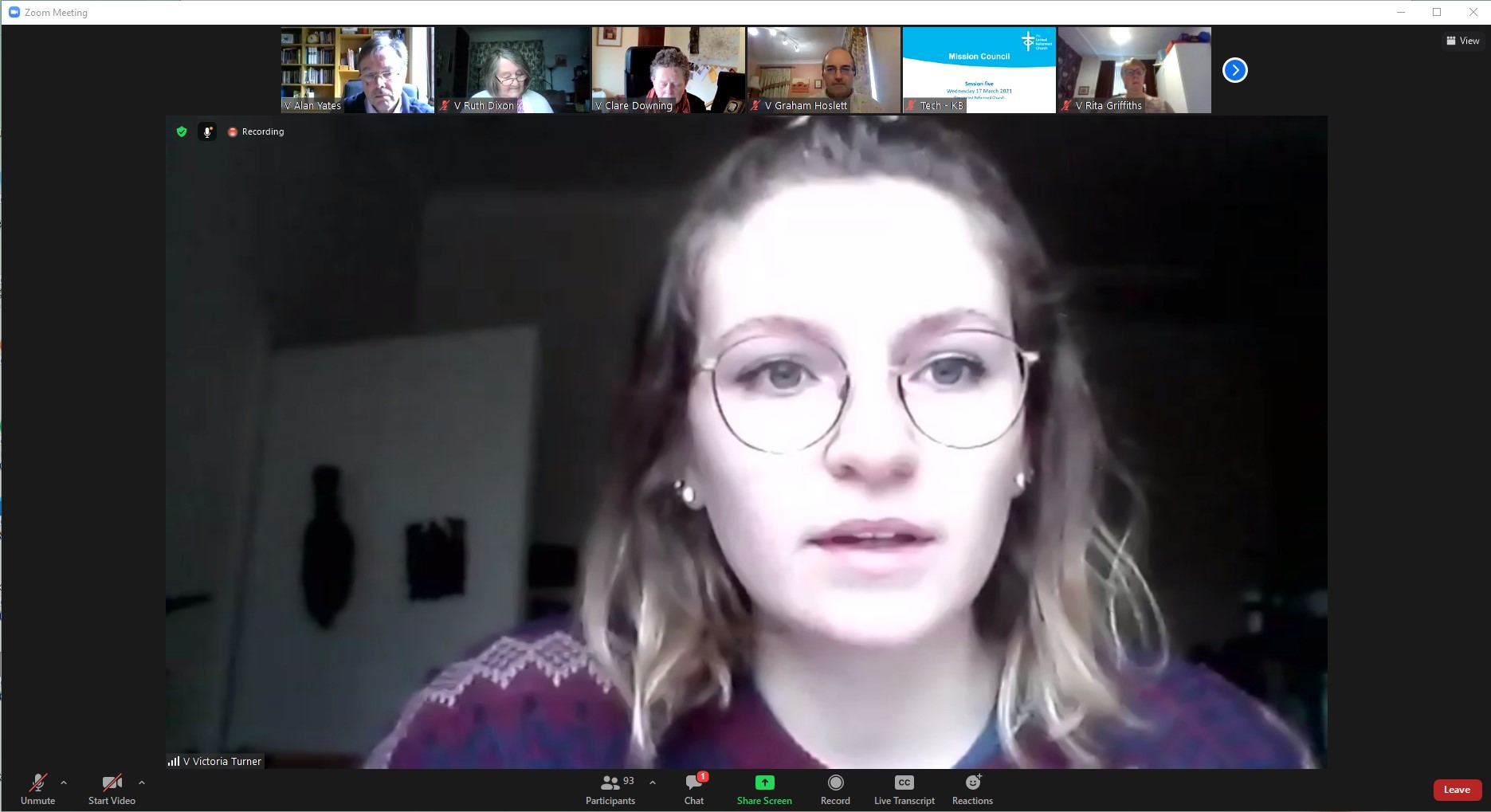 Victoria Turner said the moral responsibility should be more visible. The URC has a duty to protect its ministers and so should some sort of ‘safety blanket’ be deployed so that it’s not all down to individual responsibility.
Victoria Turner said the moral responsibility should be more visible. The URC has a duty to protect its ministers and so should some sort of ‘safety blanket’ be deployed so that it’s not all down to individual responsibility.
Russell Furley-Smith asked if all serving stipendiary ministers should be consulted as stakeholders in the pension scheme.
John Piper replied by saying that consultations will take place, as required by law, once decisions whether or not to explore possible ways forward are taken.
Paper D/H1: Marks of ministry of a worship leader and lay preacher
Paul Whittle, convenor of the Ministries Committee, opened by saying the URC was richly blessed by worship leaders and lay preachers, further evidenced by those interested in the role at a recent enquirers’ conference.
The paper was a concise and comprehensive description of what the United Reformed Church can reasonably expect of people who are called to those roles.
The expectations of ministers, agreed in 2019, had been revised after much consultation specifically for Worship Leaders and Lay Preachers.
Two benefits came with the amendments – ecumenical clarity and that they had come from the grass roots with contributions from the 13 Synod Lay Preaching Commissioners who are passionate about supporting them in their ministry.
Further work is needed, Mr Whittle added, with tying in D/H1 and D/H2, the process for becoming a Worship leader or Lay Preacher, together.
The marks that were adopted said that both Worship Leaders and Lay Preachers in the URC seek to be: a faithful disciple of Jesus Christ; a person of accountability; a crafter of worship; a preacher; a lifelong learner; a contextual theologian; a pastor; a public figure; and a reformer.
The full paper with explanations and notes for each mark can be found here.
Paper D/H2: Worship Leaders and Lay Preachers
Alan Yates, convenor of the education and learning committee, presented paper D/H2 proposing a new process for becoming a worship leader or lay preacher in the URC. Mr Yates said this was the third time he had brought a paper on this subject to Mission Council, but this was a very different proposal, following work with the ministries committee and wider listening.
Mr Yates reminded Mission Council that the decision to end the Training for Learning and Service programme created a need for training in the different and complimentary ministries of worship leading and lay preaching. Paper D/H2 sets out proposals for the recognition of these ministries, with training through the Stepwise programme, or local synod schemes. Mr Yates asked Mission Council for high level guidance, which would result in the ministries and education and learning committees bringing a paper to General Assembly.
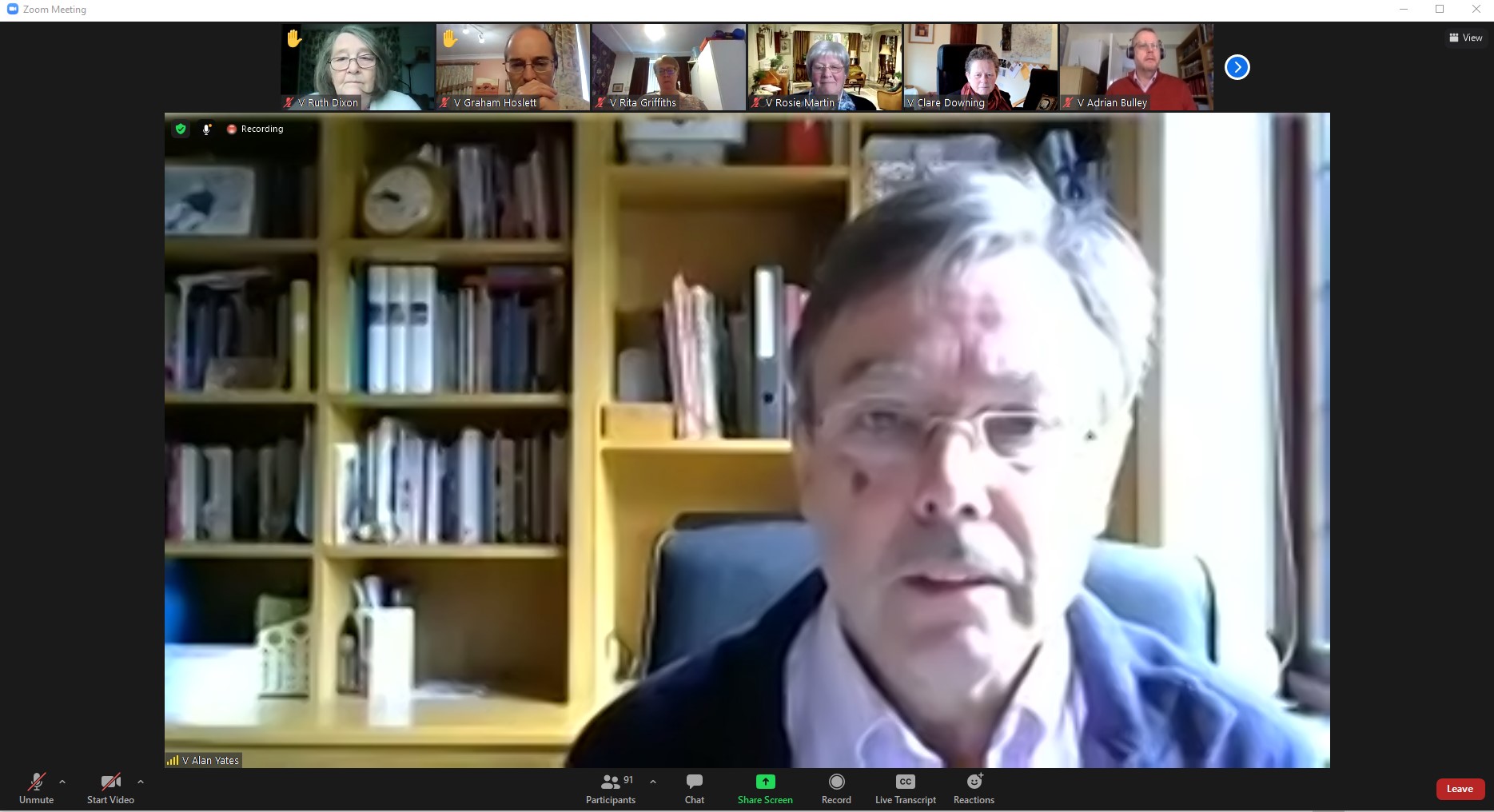 Mission Council was receptive to the proposals. Points which came out of the ensuing discussion included the following: the proposed process is not meant to be a requirement for all those leading worship or preaching in the URC, especially not those already doing so; it would be beneficial to include teaching on the use of technology, on racism and white privilege, and on personal reflection; the importance of safeguarding and DBS checks needs to be taken very seriously. It was also explained that the progression set out in appendix 1, paragraph 5 of the paper is intended as an example of the kind of development a person might go through and not meant to be a hierarchy of ministries.
Mission Council was receptive to the proposals. Points which came out of the ensuing discussion included the following: the proposed process is not meant to be a requirement for all those leading worship or preaching in the URC, especially not those already doing so; it would be beneficial to include teaching on the use of technology, on racism and white privilege, and on personal reflection; the importance of safeguarding and DBS checks needs to be taken very seriously. It was also explained that the progression set out in appendix 1, paragraph 5 of the paper is intended as an example of the kind of development a person might go through and not meant to be a hierarchy of ministries.
The resolution was carried by large majority and the Moderator, the Revd Clare Downing, said she looked forward to seeing what the committees brought in next stage.
Safeguarding update
The Revd Dr John Bradbury updated Mission Council on several developments that have taken place within the safeguarding department at Church House. Since taking up the role of General Secretary, John also took on the responsibility for Acting Deputy General Secretary (Discipleship) due to a lack of a suitable candidate being recruited to the role.
John quickly became concerned that major issues needed addressing, in particular governance. For example, it was unclear where authority comes from in the URC’s conciliar structure in regard to the actions that Church needs to take. Acting as Deputy General took up a lot of John’s time, given his other responsibilities, and it wasn’t tenable to continue. To address this, the Revd Adrian Bulley was seconded from the National Synod of Wales on a part-time basis. John expressed sincere gratitude to synod for allowing Adrian to split his time on a 50% basis to work in this way. Adrian began his work with Church House in January and will continue through to July. A new Deputy General Secretary for Disciple will hopefully be appointed. John also thanked Adrian for the efficiency and knowledge he brings to the role.
John thanked Penny McGee, the URC Safeguarding Training and Development Coordinator who joined the URC in lockdown. Penny, John said, became a trusted and respected colleague by many who developed much useful content. However, Penny handed in her notice in February and left in earlier this month to return to social work which is close to her heart. Gratitude was expressed for Penny’s work and well wishes sent her way for the future.
Thanks, were also given to Ioannis Athanasiou, URC Safeguarding Adviser, who has ceased being employed by the Church by mutual agreement.
At present, there are no safeguarding experts working at a General Assembly level of church life. Sharon Barr, Wessex Synod Safeguarding Adviser, is working four hours a week on essential safeguarding matters so that decisions can be made at Church House.
It is hoped that a recruitment drive will shortly begin to fill the vacancy for a Safeguarding Advisor as it is vital that safeguarding becomes an integral part of who the URC is and operates at all levels of the church.
Adrian then outlined the main points in addressing the governance issues, and the three things planned to bring to General Assembly, that are separate but complimentary.
1. Despite good practice and safeguarding General Assembly has never approved a safeguarding policy statement. The aim is to remedy that in July about why safeguarding is an important responsibility for all, in order to keep everyone safe. This will be worked out through a series of commitments.
2. Safeguarding is not mentioned in the structure of the Church. The aim is to propose an additional function for each council of the Church so that safeguarding is foundational in the URC’s journey to becoming a safer denomination, and responsibility for that outlined in the actions that need to be taken.
3. The advisory group is to be replaced by a safeguarding committee which will serve to ensure safeguarding is always front and centre.
Session five
Paper A2: General Assembly 2021
The Assembly Officers shared their thinking about the decision to hold a virtual General Assembly in 2021 instead of a regular meeting.
Major events planned for this summer have been cancelled or postponed, including the RHS Chelsea Flower Show, Glastonbury and the Royal Welsh Agricultural Show. The General Assembly of the Church of Scotland is taking place virtually this year.
Coronavirus vaccines are being rolled out at speed but we should not expect that the vaccination programme will be completed by early July. There might also be further outbreaks of the virus.
The UK Prime Minister’s roadmap for easing lockdown in England means a decision confirming gatherings such as General Assembly can take place will not be made until later this year and so too late for the July meeting.
The booking with the Christian Conference Trust (CCT), owners of The Hayes, for July 2021 has been cancelled and all monies paid for 2021 will go to the 2022 booking, the same for the Travelodge booking for overflow accommodation. The cancellations mean no financial cost to the United Reformed Church.
The virtual meeting of General Assembly over the same long weekend in July (9-12) using Zoom will build on the experience which has been gained from hosting three virtual meetings of Mission Council.
URC Youth and the Head of Children’s and Youth Work are considering options for a gathering for What Do You Think, and the Clerk and Head of Communications are exploring digital mechanisms for electing a Moderator of General Assembly.
Paper D3: Education and Learning – Discipleship development fund
Mission Council accepted the revised discipleship development strategy and its complementary discipleship development fund policy and operation.
Working in conjunction with the Walking the Way steering group, the Education and Learning Committee simplified and updated the discipleship development strategy (DDS) and provided greater access to the discipleship development fund (DDF) to further the aims of the strategy.
“The aim is to deplete the fund in a decade,” said Education and Learning Convenor Alan Yates, “as well as to share achievements and lessons learned.”
The strategy document was too long and unwieldy for many to easily understand, the paper said, or to use. As such, a more integrated approach was offered.
Since 2016, much has been offered by local churches – audio, video, printed word – with efforts to engage, encourage, support and love local communities. No longer can ‘what we have always done’ be accepted as there was a need to step up and step out into the new reality which is emerging.
“We want to empower and inspire faithful, missional people who can dream dreams and see visions and join in with the amazing things that God is already doing in the world,” the report said. “We want to resource, encourage, and enable people who want to share the abundant and life-giving love of God with the communities they encounter.”
Alan Yates responded to several questions and comments, some of which mentioned richer synods considering not applying to the fund.
Jenny Mills, Secretary for Education & Learning, said the committee was working hard on how the money being spent is changed to development of people and not processes.
Alan Yates confirmed that £200 can be given as an annual award and added that it was trying not to limit the creativity about the use of the money. For example, the funds have to be used at URC events but that doesn’t exclude others from taking part.
Steve Faber, Moderator of West Midlands Synod, said that the Windermere Centre was available for the whole of the URC and so this fund should be available to all.
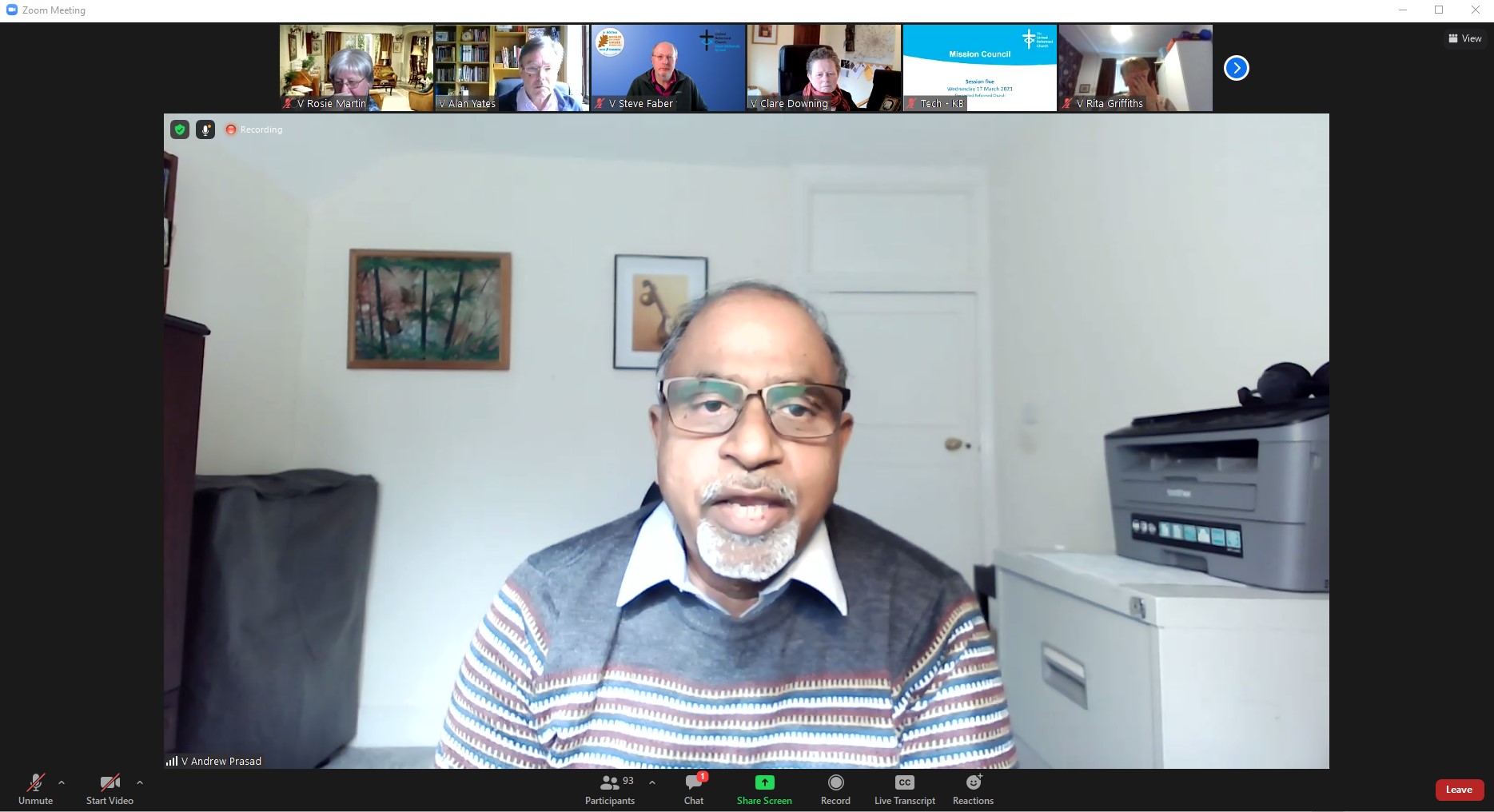 Andrew Prasad, Moderator of Thames North Synod, said that too often we ask richer synods to do things, which in turn encourages them to have a life of their own. They should stand in the queue in the same way we that all do, he added. Those Synods can always contribute more to central funding pf the Church if they choose, and therefore should be treated equally.
Andrew Prasad, Moderator of Thames North Synod, said that too often we ask richer synods to do things, which in turn encourages them to have a life of their own. They should stand in the queue in the same way we that all do, he added. Those Synods can always contribute more to central funding pf the Church if they choose, and therefore should be treated equally.
In the coming months, clarity will be added to the ‘how’, ‘who’ and ‘when’ of the strategy so that the Committee can be held accountable for its focus on missional discipleship. Further promotion about the existence of the fund will also be made.
Paper J3: Supplementary Nominations – Report 2
The Revd Ray Adams, advised Mission Council that the Revd Geoffrey Felton has been appointed to serve the Mersey Synod as its Moderator. A started date of 1 August had been agreed between the Synod and the Revd Dr John Bradbury, General Secretary of the URC. This nomination was accepted by Mission Council and Geoffrey was congratulated by Peter Pay, General Assembly Moderator who was chairing the session. In turn, Geoff thanked Mission Council and said that he was looking forward to the serving the Church, the synod, and the area in his new role.
Church leaders statement on Statement from Church leaders on the UK government announcement on warhead numbers
The Revd Clare Downing, advised Mission Council that Francis Brienen, Deputy General Secretary (Mission), would speak on the government’s recent review of its defence, security and foreign policy to increase the number of nuclear warheads the UK has.
Francis said that the government’s decision is clearly a hugely retrograde step, and completely at odds with the painstaking work that the URC and many other Churches have been supporting for many years in moving towards non-proliferation of nuclear weapons. Most recently this has been an interfaith statement and video that our Assembly Moderators were part of when the UN Treaty on the Prohibition of Nuclear Weapons passed into law in January, and by General Assembly Resolutions in 2016.
Francis advised that Churches had taken swift action in reaction to the announcement of the government’s decision by issuing a statement which had been coordinated by the Joint Public Issues Team. Clare has signed the statement on behalf of the URC. The statement can be read here.
Paper I4: Walking the Way
Francis then presented an overview of Walking the Way. Feedback from a number of groups and individuals has been sought recently and funding is assured until the end of this year.
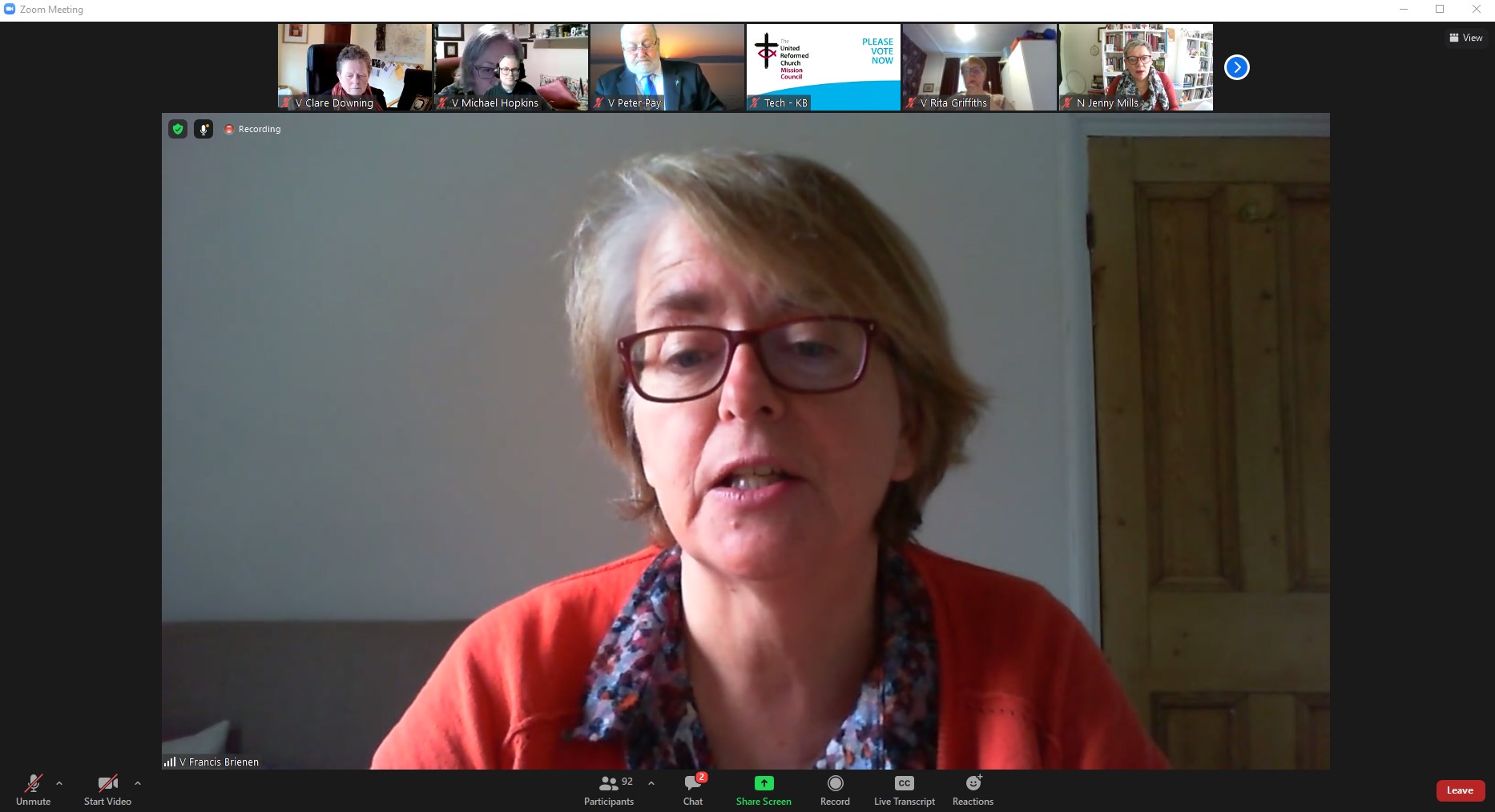 The Walking the Way steering group has found the feedback helpful although, added Francis, some of which has not been easy to hear. However, through the feedback the steering group has identified certain patterns and has split into two groups to focus on exploring the feedback in depth and the future strategy of Walking the Way and resources. Through this exploration, five areas for future proposals are beginning to emerge.
The Walking the Way steering group has found the feedback helpful although, added Francis, some of which has not been easy to hear. However, through the feedback the steering group has identified certain patterns and has split into two groups to focus on exploring the feedback in depth and the future strategy of Walking the Way and resources. Through this exploration, five areas for future proposals are beginning to emerge.
1. A future focus on collaborative working, rather than something focused or directed by the steering group
2. A focus on asking every URC committee to include Walking the Way on its agenda
3. Enabling/encouraging/equipping others to keep discipleship at the heart of what they’re developing
4. Produce only very specific things under the Walking the Way banner
5. Branding: find a far stronger connection between the URC logo with Walking the Way, and use that for Walking the Way rather than a separate logo.
Discussion from the floor included praise for Walking the Way’s Project Leader, Simon Peter, who was called an “absolute delight” to work with by the Revd Jenny Mills, Secretary for Education & Learning. Jenny said: “He sees connections where many of us don’t. He’s so keen for everybody to be involved and I would like to commend how easy it is to work with him.” Other queries included how a series of online events, produced by Walking the Way would be publicised. Francis clarified that the events and other activities would be publicised through Walking the Way’s e-newsletter, social media channels, and other channels.
Reuben Watt, URC Youth Assembly Moderator, highlighted and commended the Lent activity packs produced with the help of Children’s and Youth Work, how practical the packs were and how all households can get involved with them.
Other queries centred on what the original aim for Walking the Way was when the Council for World Mission grant had been applied for and whether that aim had been reached.
Francis clarified that the original aim for Walking the Way was very much the whole idea of change of ethos and culture in that all that the URC does with a focus on missional discipleship. This focus is a long-term aim though which some concrete goals have been achieved. Although the overall long-term aim has not.
Simon is undertaking an ongoing evaluation of Walking the way, but, Francis added, there are some parts that are difficult to measure as we are talking about change of ethos and culture. Certain things are measurable ie the take up of resources and feedback from people. However, she continued this illustrated the importance of sticking with Walking the Way because of the long-term aim.
Session six
Mission Council closed with worship, led by the Revd Helen Everard and a Bible study by Peter Pay.
Reporting: Andy Jackson, Ann-Marie Nye, and Steve Tomkins
